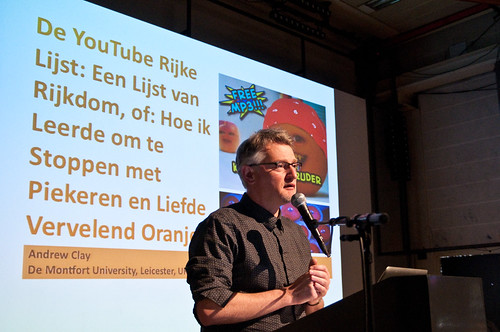By Nicola Bozzi
A media theorist and lecturer at Leicester’s De Montfort University, Andrew Clay has been investigating online video for some time. As an opener of the sixth edition of Video Vortex, his intervention explored YouTube and effectively went a bit beyond, as the Reader tagline suggests. The British theorist raised several compelling questions about the popular video sharing platform, inspiring the audience to ask quite a few questions at the end. In particular, his analysis of the top YouTubers – the ones who got rich by putting serial sketches online and engaging the community – took stock of the YouTube experience so far, focusing on the blurrier and blurrier distinction between amateurs and professionals.

Criticizing taste-based evaluations of content such as Andrew Keen’s Cult of the Amateur, Clay took notice of the most successful video genres – that is, comedy and entertainment-enhanced news. What seems to be the most interesting aspect of the phenomenon to the British professor, though, is the community and the networking possibilities that it enables. Top YouTubers not only partake in the same superstardom, amplified by increasing collaborations with each other, but also have the capacity to engage the audience in a participatory media space, as well as casual crowds.
Apart from the YouTube-specific discourse, Clay put the platform in relation to other preexisting media – like Mtv, once the mainstream source for edgy content – and pondered on future developments. For example, it is clear that the website wants to get more and more involved with television, while maintaining and extending its online supremacy even by schooling and workshops in less media-savvy countries – a bit like Current TV did in its early days.
If YouTube’s merit has been that of bringing niche into the mainstream – narrowing the technical gap between professionals and amateurs – according to Clay there is a deeper, hidden purpose that drives people to struggle in order to establish their niche presence on the internet giant’s surface. Quoting German philosopher Martin Heidegger, he argues such focus on inauthentic lives is a human attenpt to scare death away. We don’t know if the Annoying Orange will be forever remembered, but it might definitely survive its author.
For Andrew Clay’s presentation see, here




